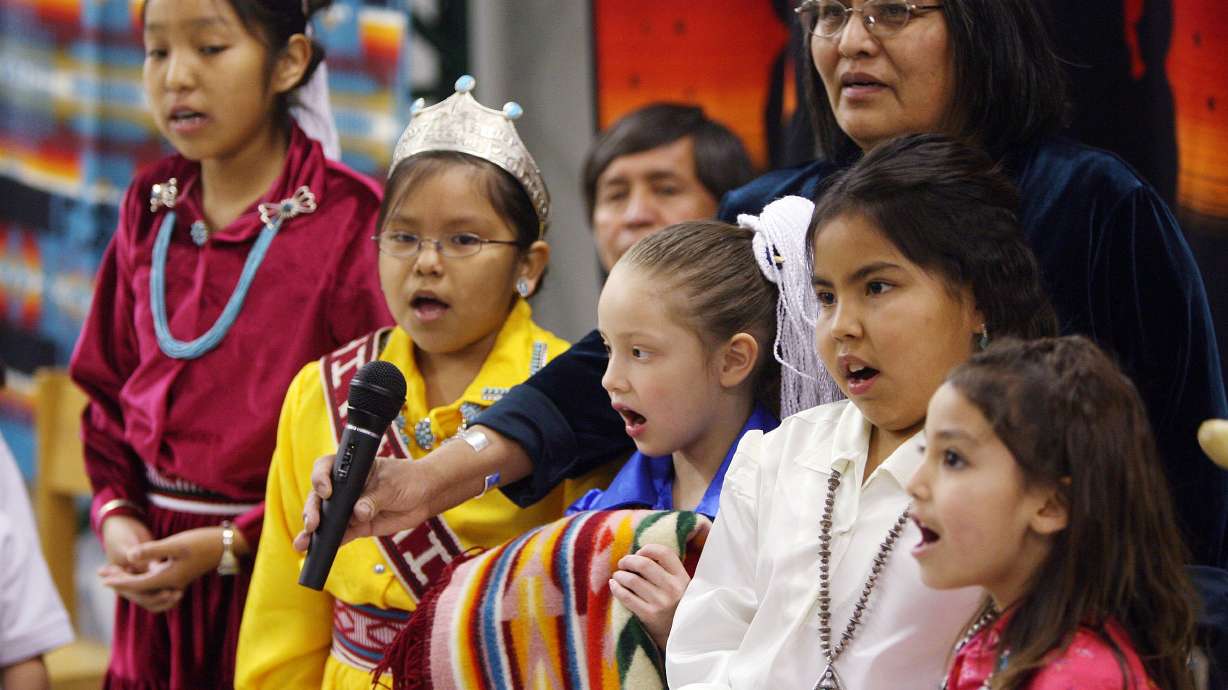Estimated read time: 5-6 minutes
This archived news story is available only for your personal, non-commercial use. Information in the story may be outdated or superseded by additional information. Reading or replaying the story in its archived form does not constitute a republication of the story.
SALT LAKE CITY — The Utah House Judiciary Committee voted 7-5 Thursday to hold a bill patterned after the federal Indian Child Welfare Act, which offers protections for Native American children during adoption and foster care processes.
A hold blocks a bill from advancing to a vote on the House floor, although it may be reconsidered at a later point.
HB40 received numerous supportive public comments during a committee hearing and zero public comment opposing the bill. It is also backed by Utah's eight Native American Tribes, Attorney General Sean Reyes, Lt. Gov. Deidre Henderson as well as Utah policy, legal and foster care groups and the state's Native American Legislative Liaison Committee, which voted unanimously to introduce legislation during this session.
The bill comes as the Indian Child Welfare Act faces a Supreme Court challenge. The act was enacted in 1978 in response to the systemic removal of Native children— often without cause — from their families and tribes. In fact, about a third of all Native children were removed prior to the Indian Child Welfare Act, with 85% being placed outside their families and communities even when fit and willing relatives were available.
"We saw this removal as being something that was very damaging to these Indian kids," said Dustin Jansen, director of the Utah Division of Indian Affairs. "They were being placed outside of their culture, outside of their homelands and outside of the opportunity and access to their language, their spiritual religions and the everyday information that they would absorb organically on what makes them them."
Plaintiffs argue the Indian Child Welfare Act violates the 14th Amendment by racially discriminating against non-Native families. Under the act, placement of Native children is prioritized first with their family members (including non-Native kin), then with members of their own tribe, followed by other Native families. Proponents of the act point out that "Indian" is a legal status based on government-to-government treaties between the U.S. and tribes as opposed to a racial identity. Adoption or foster proceedings for a child with Native ancestry who is not an enrolled member of a tribe, for example, would not fall under the act.
Tribes can and do work with non-Native individuals interested in fostering and adopting Native children; however, many ask prospective parents to agree to an open adoption so the child can maintain connections to their tribe and family.
"That can be really scary, I think, for first-time families looking to adopt. I can tell you, having done it four times, it's not scary at all. As an adoptive parent, you set the times, you set the rules, you set the stage on how any of that interaction is going to be," said Jansen, who adopted all four of his children through the Indian Child Welfare Act process. "ICWA doesn't replace the 'best interests of the child' standard but actually enforces it."
Rep. Nelson Abbott, R-Orem, expressed concern about how parts of the bill are written, specifically relating to definitions of extended family members and standards for removal that would defer to tribal laws and customs or federal law. Abbott said those definitions might present difficulties for Utah judges who are unfamiliar with tribal laws and customs.
"Maybe with the eight tribes, through negotiation, we could get to a point where we can specify that and put that in the code so that a judge isn't forced to call in expert witnesses to testify about the culture of a given tribe to determine what an extended family means," Abbott said.
"I understand and appreciate and support the efforts of the tribes to try and preserve their relationships," he continued. "I'm just hesitant because when I vote on a statute, I want to be able to read it and understand it, and I want other people — whether it's a judge or an attorney trying to work it or just a member of the public — to know what it means, and I'm not sure we're here with this."
Rep. Christine Watkins, the bill's sponsor, said she and the legal experts who drafted the bill are willing to work with individual representatives on their concerns, but that the legislation also received months of review from tribes, their legal counsel and the Utah Attorney General's Office.
Rep. Karianne Lisonbee, R-Clearfield, said she felt the bill wasn't yet necessary since the Supreme Court case regarding the Indian Child Welfare Act has not yet been decided.
"I'm concerned that we might be preemptively making a decision that has implications we don't quite understand in Utah," she said. "I would support this policy in the future depending on the disposition of that case."
Other representatives voiced support for moving the bill forward, including Rep. Brian King, D-Salt Lake City, who said holding the bill is "a recipe for it sort of getting lost." Reps. Cheryl Acton, Rex Shipp, Mark Wheatley, King and Watkins voted against holding the bill.
"I don't like to always wait on judicial decisions coming out far away and so forth. So, I like to just act as a sovereign state, which we are," Acton said. "I think we can go ahead and confidently vote to move it forward."
Committee Chairman Rep. Jon Hawkins, R-Pleasant Grove, said the bill would be added to a future agenda.
Watkins said Friday she is unsure of her next steps regarding the bill.










